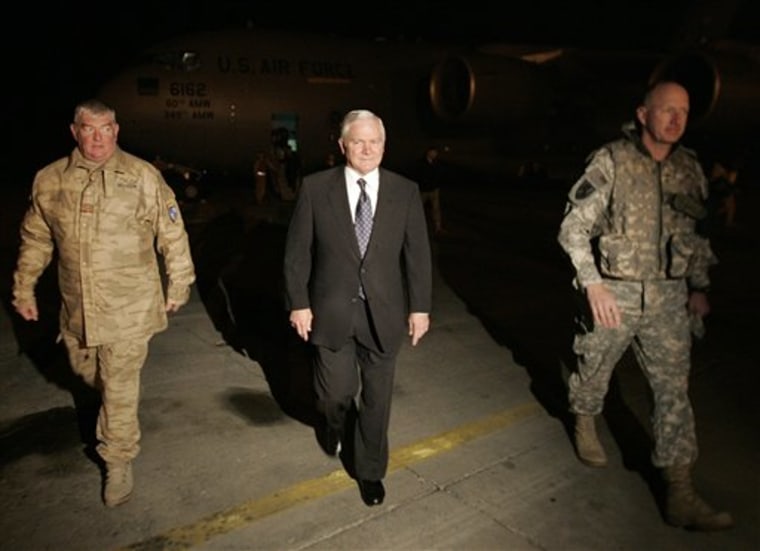The U.S. military is seeing early signs that al-Qaida may be stepping up its activities in Afghanistan, a senior defense official revealed for the first time Monday as Secretary Robert Gates made his third trip to this country.
Gates said he has not yet seen data on any uptick in al-Qaida activity, but he said increasing levels of violence in the country are a concern and he plans to talk about it with other defense leaders from NATO nations operating in Afghanistan.
"I'm not worried about a backslide as much as I am (about) how we continue the momentum going forward," Gates told reporters en route to Kabul. "One of the clear concerns that we all have is that in the last two or three years there has been a continuing increase in the overall level of violence."
The senior defense official said the U.S. military is concerned and is looking for definitive signs of greater activity by al-Qaida and foreign fighters, but the U.S. has not seen enough proof to draw any final conclusions. The official discussed the terrorist network on condition of anonymity because of the security concerns.
Weapons for local tribes?
As Gates headed to Kabul, U.S. officials also said they are now considering the possibility of providing arms to local tribes in Afghanistan, along with training, equipment and other support. The effort would be modeled after successful efforts in Iraq to empower the locals to police their own neighborhoods.
While no decisions have been made, officials said the plan is under review.
The U.S. military has been pushing the idea that more attention must be paid to tribal leaders in the provinces in both Afghanistan and Iraq, rather than focusing all the attention on buttressing the central governments of those two wartorn nations. The thinking is that the locals are closer to the community and their people, and thus can better police their own streets.
Military officials have said they believe that the Taliban in Afghanistan is being refueled, possibly by militants in Pakistan crossing the border, or through support from other countries in the region sympathetic to the militants.
Insurgents are also finding more financing, including by taxing the widespread poppy crops that are used to make opium drugs.
Senior officials with Gates said they are troubled by the overall increase in violence in Afghanistan, particularly in the south. And they said it will be a key topic of discussion when Gates and other defense leaders from countries involved in the coalition in that region meet in Scotland later this month.
Most violent year since invasion
This year has been the most violent since the U.S.-led invasion of Afghanistan in 2001. Insurgency-related violence has claimed nearly 6,200 lives, according to a tally of figures from Afghan and Western officials.
The number of attacks has surged, including roadside bombings and suicide assaults.
Currently there are about 26,000 U.S. troops in Afghanistan, including 13,000 with the NATO-led coalition. The other 13,000 U.S. troops are training the Afghan forces and hunting al-Qaida terrorists.
Defense officials said that while NATO is still looking for at least a battalion of troops to supplement the fight in Afghanistan, the U.S. is not, at this point, moving to fill that need. Gates pressed NATO leaders earlier this year to fill some of the gaps in equipment and troops in Afghanistan, but got only a lukewarm response.
Gates is expected to meet with key country leaders, including President Hamid Karzai, during his visit, as well as talk to commanders about the conditions across the provinces.
He also is hoping to gauge what impact, if any, the internal problems in Pakistan have had on the ability of that country's military to adequately monitor the volatile border region.
Gates' visit coincides with the release of a new poll that found Afghans are increasingly critical of U.S. military efforts, with just over half of Afghans still having confidence in the ability of U.S. and NATO forces to provide security — down from two-thirds a year ago.
The survey — conducted for ABC News, the BBC and the German public TV station ARD — noted that Afghans overwhelmingly prefer the government of Karzai to the Taliban, but they also believe that government should negotiate with the Taliban to end the war.
In southwestern Afghanistan, support for NATO-led forces has plummeted to 45 percent this year, from 83 percent a year ago, it found.
"Civilian casualties blamed on these forces is a prime complaint," the survey said.
